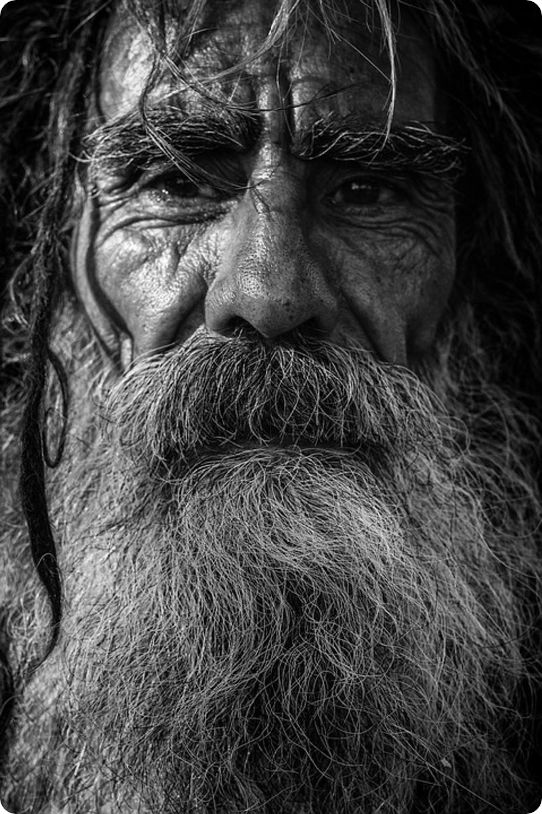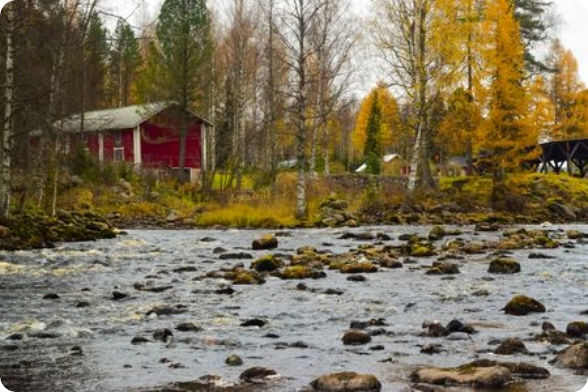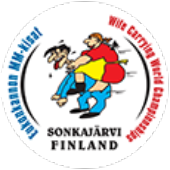THE CHARACTER BEHIND WIFE CARRYING: THE STORY OF THE ROBBER RONKAINEN
HERMAN ”HERKKO” RONKAINEN
Herkko was born around the mid-1800s on the Ronkala farm in Sukeva. His childhood must have been, like everyone at the time, full of work, but somewhat happy. Herkko is said to have been a lively joker already as a child, but kind-hearted. He did not intentionally bother anyone, but as curious and keen to experiment he got into all kinds of trouble. As he approached adulthood, Herkko had grown into a quiet, kind and fair man, although he was also known as quick-witted and easily fiery.
Herkko was skilled with his hands and as a young man he was apprenticed to a shoemaker in Sonkajärvi. The tall shoemaker’s apprentice was to the taste of many girls in the village, and it wasn’t long before one of the girls had messed up the poor boy’s head. For a couple of summers the young people courted and the girl was like a gift from heaven, charming and sweet. However, they did not exchange rings as Herkko was only an apprentice to a shoemaker and had no income of his own, let alone a house.
Then came the winter when the old shoemaker fell ill with lung disease and passed away. Herkko took over the duties of a shoemaker in the village, and soon his wedding was celebrated on the eve of summer. That was the end of Herkko’s carefree youthful days. It turned out that beneath the sweet surface of the new wife lived a fierce terror. A man with a sensitive soul like Herkko did not do well with such ill treatment, as the wife didn’t think anything was enough, and everything was always too much. So Herkko began to seek peace in the forests. At first, he went for a day at a time to experience trap wires and fish, but little by little, Herkko was caught up in the enchantment of the forest and he easily spent a week there. The tall shoemaker began to get color on his skin and muscles on his frame.
As the years passed, Herkko’s travels became longer and he was rarely seen at home anymore. Herkko’s travels already extended to the whole parish, and as he roamed, he worked as a shoemaker where there was a need and sold his hunting quarry to those who needed it. During his travels, Herkko’s eyes opened to the misery and poverty that often prevailed in the parish’s croft. However, most, in spite of their misery, offered him a place to sleep and shared their lean suppers with him. Herkko made a habit of leaving a coin or two on the table of these kind-hearted people, as far as he happened to have one.

On one occasion, Herkko was returning home from a summer-long tour of the parish. The earnings he had gathered throughout the summer weighed in his pocket, and he thought they might appease his wife a little so he could stay in the warmth of the stove at home again for the winter. There was less than a day left before he reached home, and in good weather he would probably have continued through the night and knocked on the door in the morning. Now, however, the sky crashed down in heavy rain and the wind whistled so that even a big and strong man of Ronkainen’s size found it difficult to stay on the trail. Herkko stopped to ask for a place to sleep in a small croft that happened on his path. It so happened that only the wife with five small children was at home. The poor wife was startled by Ronkainen as he clambered in. And no wonder, because Ronkainen was a wild sight: a couple of metres long and as wide as in a barn door, wounded by summer vagabond life and soaked in autumn rain. There they stood, looking at each other. The crofter’s wife saw a ferocious robber who had invaded her hut, intending to do who knows what. Herkko, on the other hand, saw misery and a difficult life, both in the woman and in the five children who tried to hide in their mother’s bosom. The terrified woman could not get a word out of her mouth, and Herkko, who was deeply touched by such misery, made up his mind in an instant. He removed the heavy mass of money from his belt and carefully placed it on the table in the hut. As he left, he simply said, “You need those more than I do.”
Returning home was chillier for Herkko than the freezing autumn rain. His wife couldn’t understand how he could return empty-handed from a trip that lasted all summer. After all, the man had travelled around the villages before and had always brought a mass of money to secure the livelyhood for the winter, and even to buy clothes for the holidays. Herkko, on the other hand, did not understand what the wife was going on about. Of course, they needed to tighten their belts for a bit, but surely the villagers would need the services of a shoemaker during the winter. They would manage somehow and besides, many others had it much worse than they did.
FROM HERKKO TO ROBBER RONKAINEN
During the winter, rumors began to circulate in the villages about a ferocious robber who robbed the rich and helped the poor. According to one story, in the autumn the thug had invaded a fisherman’s croft and rumbled so that the door had almost become of it’s hinges. He had then said with a bearish murmur that in this croft there would be use for what was left over from the rich in the city. When the man had gone, a gold treasure had been found on the croft step.
Those stories were wild, but as we already know, there was a little bit of truth in them. Herkko’s wife realized this too and managed to add enough things up in her wicked skull to squeeze the truth out of her husband. Well didn’t that blow up a storm, when the wife, small and delicate, used a broom to beat Herkko, a man over two metres tall, who, in truth, looked more like a fabled giant than a kind shoemaker. But now Herkko’s had at last had his fill. He had done his best with the battle-ax he marrried, and tried to behave himself like a human being, at least for the time he spent at home. Herkko turned and snatched his wife, with her broom and all, into his bear embrace, and began to tread with long determined steps into the depths of the forest. The hillls rang loud, and surely half of the county could hear what the wife thought of her husband. Herkko, on the other hand, did not utter a word. With a face distorted with anger, he made his way through the snow and finally laid his wife on a rock in the middle of the forest. Herkko said bluntly, “This is enough!” and started to take long swift steps towards home. She did try to follow him, but small and delicate as she was, she could not keep pace with her husband’s long strides.
When she finally got home that night, there was a fire in the sauna and soup on the stove warming up. But Herkko was nowhere to be seen, nor the man’s possessions or clothes. Herkko had had enough, and after shaking off his wife from his heels, packed his things and headed towards the backwoods of Sukeva. There he had a hideaway by a pond full of fish, and there was plenty of game in the forest. He occasionally went to his wife at night to take game and furs, which she could sell for a living, but Herkko never returned home again.
When spring came, Herkko went around the parish again and worked as a shoemaker, but by now the stories of the benevolent villain had spread so widely that Herkko’s work began to suffer. Even those who had previously known Herkko to be honest began to look on suspiciously, and the mean-spirited claimed that Herkko had stolen things from them. So Herkko had to sneak into the shelter of the forest and rethink things there. The man didn’t want to go home, and he couldn’t survive on game and fish alone. Herkko expanded his travels further afield, all the way to Kajaani and Kuopio. And since the stamp of a villain had already been stamped upon him, he might occasionally pick up something that belonged to someone else. Herkko was always generous in helping those in need who showed him kindness.
Herkko’s reputation grew, and a group of men, who either admired Herkko’s way of life and wanted to live the same way themselves, or were otherwise barren to the authorities, began to gather around him. Most of the former, in particular, Herkko sent home without delay. Herkko did not accept murderers or hotheads either. This is how a gang of robbers began to form in the forests of Sonkajärvi, arousing both fear and admiration among the nearby residents. The gang of robbers usually stayed somewhere in the Sonkajärvi or Sukeva area. Summers were spent raiding, and when winter came, the group dispersed to their respective quarters, to hideaways in the forests of Savo or Kainuu, or homes of those who still had their real homes.


TO THE CHASTISEMENT ROOM AND SIBERIA
On one occasion when the men were on a “market trip” in Kuopio, an argument broke out with the locals in the evening. No one could say for sure afterwards where the trouble had started. The men had enjoyed some spirits and Iivari, one of Ronkainen’s troops, was accused of theft. The allegations were certainly not false, but why admit to them out of hand. So a verbal altercation began, which, after a little bickering, escalated into a mass brawl. A man or two was beaten and injuries all around were not avoided. Finally, Herkko and his troops managed to break away from the fight and left quickly and quietly towards Sonkajärvi. Ronkainen’s group had suffered no injuries worse than contusions in the fight, except for Kaaleppi, who had a nasty knife cut in his hand. The knife had also done damage among the locals, and at least two Kuopio residents had knife wounds in their skins, and as luck would have it one of the men had been stabbed to death.
Manslaughter would be punishable by at least life imprisonment, and since the Kuopio residents involved in the fight did not want blame to come to themselves in any way, everyone was quick to blam the non-residents. The only one whose characteristics they could give with some precision was Herkko Ronkainen. After all, this was a large man who stood out from the crowd.
So the authorities started asking for Herkko, but they couldn’t find out much. The people of Sonkajärvi had little reason, desire or even means to help catch Herkko, but there was one who had all the reasons; Herkko’s wife. She had grown her bitterness, even though Herkko continued to bring things to her steps at night, sometimes a sack of grain, sometimes a mass of money, and she had not forgiven Herkko’s actions. So the wife told the authorities what she knew, and men were put on guard around the hut. Perhaps Herkko’s good luck had finally come to an end, as it had not been a week when Herkko arrived to bring the money to his wife’s step. There was quite a scuffle and Herkko almost escaped his captors, but five men managed to overthrow the robber chief.
The charges were read for theft in the area of five parishes, causing disturbance and aggravation, and manslaughter in the Kuopio market. Herkko did not speak much in court. What was there to say after all, he had robbed one thing or another along the way. It was difficult to deny what had happened in Kuopio when ten men swore that he had gone on a rampage there. The drunken fight was somewhat obscure to Herkko. Herkko Ronkainen was sentenced and sent to serve a life sentence in the Turku disciplinary room.
Herkko did not stay in Turku for long, as he applied to the emperor for a transfer to a labour camp in Siberia. Due to good behaviour, the transfer was approved and the Secretary of State announced the Emperor’s approval on 27.2.1885. In Siberia, Herkko was forced to work in a gold mine. In Herkko’s opinion, life in a forced labor camp was not life at all, so he began to plan an escape. At the mine, he had become acquainted with a ostro-bothnian named Haapoja, and together the men fled the camp and began the arduous journey home.
During the journey, however, Haapoja’s evil nature was fully revealed and the two men parted ways. Haapoja continued his journey to Helsinki and Herkko decided to travel to southern Russia to arouse confusion. However, homesickness must have set in, and so Herkko turned back from Vyborg. Only Herkko himself knows for sure what happened on the trip, but some wild stories are told about that journey. But let’s not give them any heed, because they are even wilder than the story of a fisherman’s croft. I will say, however, that Herkko was not alone on that journey. When he returned to Sonkajärvi, he was accompanied by “Eerikki” Vodorov and Aapeli Rottinen.
HOMECOMING
Herkko returned to Sonkajärvi after being away for three or four years. In the meantime, many things had changed. Herkko’s wife, who no longer had the income brought by her husband, had had to leave her croft and reportedly was now living in the care of a benevolent relative in Ostrobothnia. Herkko thought this was only good, because how should he have dealt with this nagging, ungrateful, and deceitful woman? Fortunately, there was no need to think about it now, but other changes could not simply be ignored. As Herkko approached his home region, he noticed that his former hospitality had almost disappeared. The houses where he had once been welcome were now chilly places. At most, the people offered accommodation in an empty cattle shelter and often the reception was even harsher, even a gun barrel was offered.
At the familiar fisherman’s croft, however, the reception was warm when the fisherman’s wife recognized her benefactor. There, Herkko also got an explanation for the begrudging reception. After Herkko left, the gang of robbers had initially thinned out due to the lack of a leader. Last summer, Jalmari, who was a vicious and foul-mouthed man, had taken the lead. The gang of robbers had grown over the past summer, and they didn’t care who they took from or how much. They took both the fisherman’s coins and the silver of the manor, and the gang seldom bothered to go on long excursions, but ruthlessly taxed the surrounding areas. Herkko was so angry that he would have attacked Jalmar if Eerikki, Aapeli, and the master of the croft had not restrained him by force. Herkko was carried to the lake to cool off and the sauna was heated. As the evening grew darker, plots were hatched in the steam of the smoke sauna to tame the gang of robbers.
At dawn, Herkko, Eerikki and Aapeli set out to check out the places that fit their plans. The parish hadn’t changed so much that Herkko couldn’t easily find what he was looking for. Then they set out to find the camp of the bandits. The task did not present much difficulty for Ronkainen, and the trio was able to easily bypass the thugs guarding the camp. Herkko and his comrades made it all the way to the camp before they were spotted. Then Herkko burst into laughter like a madman. Laughed and laughed until the whole camp either laughed with him or stared at him like crazy. Those who were among Herkko’s old people came warmly to greet their leader, but the others had some reservations about Herkko Ronkainen. Herkko’s appearance had not been very trust inducing or gentle since his youth, and now that it was hardened not only by the harsh years of robbery, but also by the times spent in the penitentiary and in Siberia, the sight was very wild. Perhaps that is why there was no major controversy and everyone agreed to Herkko’s terms either of their own volition or under pressure from the group.
Herkko spoke the following: Herkko Ronkainen was the only one who was allowed to lead a gang of robbers in this parish. If anyone wished to challenge him, they would have to win a race on a route Herkko had chosen. Furthermore, in order to distinguish good citizens from genuine villains, candidates would carry a full bag of rye on their shoulders throughout the race. Similarly, if someone wanted to be part of Herkko’s group, he should be able to follow the same route without dropping his load or walking once. Anyone who would not clear the course would leave with a spanking.
Jalmari and the gang really had no choice but to agree to Ronkainen’s terms, for only few were willing to defy Ronkainen, who had survived the chastisement house and Siberia as if by witchcraft, now standing in full strength before them. The route chosen by Herkko was in difficult terrain and the runner had to jump over fences and fallen trees, as well as wade through flowing streams. And as one would guess, not many people made it through the course and one after another Jalmari and his men went away embarrassed. From that day onwards, this run was considered an entrance test to Ronkainen’s troops. And so that no one would have said that the task was impossible, Ronkainen always ran with the candidate. A real popular amusement could have arisen from this, but the failures received such a spanking that not everyone dared to try out for a place in Herkko’s camp .
So Herkko Ronkainen had returned home. The camp was kept where ever, usually somewhere in the backwoods of Sonkajärvi or Kainuu. The raids were always directed further away, around Lake Oulujärvi, Karelia, South Savo and even Ostrobothnia on some occasions. The premises of Sonkajärvi were left in peace, because who dares to start robbing at home? Then you would only get the wrath of good people, and there would be no peace in those forests. Herkko and his troops therefore went on raiding expeditions, sometimes in the east, sometimes in the west, and whenever they returned home, there was something to bring to the needy. In this way, Herkko could rest easy, for who would report their benefactor to the authorities?
RETIREMENt
For many years, Herkko was able to continue his beloved life in the middle of the forests, but finally the day came when Herkko had had enough and decided to settle down. He bought a house in Lehmilahti in Sonkajärvi and spent the twilight days of his life there. Relatives say that Herkko was a quiet and gentle man, although fierce and frightening in appearance. The children of the village were afraid of Herkko at first, but as they got used to the man, they often gathered at his house to listen to the violin play. Herkko died as an old man in 1922 and is fondly remembered.
AUTHOR’S WORD
The above is partly based on known facts and on the description of Herkko by relatives I received from Veikko Ronkainen. However, it should be remembered that the story is largely a figment of the author’s imagination. Thanks for creating the story also go to my brother, who at the beginning of the writing work helped me find answers to such difficult questions as why and how.
Annakaisa Paldan
Herkko Rosvo-Ronkainen was a brisk, freedom-loving man. Herkko’s feisty nature often led to fisticuffs with groups of men, with scars here and there adorning Herkko. Also those whom this Ronkainen accepted into his troops were swift. During the summer seasons, hiding in the woods and stealing food from the barns of houses, this group of men aroused fear in their surroundings. Manners being like this, no decent girl dared to go to Herkko. Admittedly, a wild rumor said that Herkko was an affectionate and considerate lover. This rumour had already reached neighbouring villages. But Herkko loved freedom. No orders, no regular job, no same place of residence and no regular girlfriend. After all, a woman’s soft embrace sometimes came to Herkko’s mind, even under the blankets. It came to mind… aah! Because of his lifestyle, Ronkainen and his friends had to find the warm embrace as if by force. Girls from neighboring villages were then in sights. Here, if anywhere, strength was needed. Of course, she resisted, and the only way to reach his goal was to roll her over his shoulders and lock her arms and legs with a firm grip. Then the struggle would make no difference. As the men leapt over fences, rocks and stumps with a girl on their shoulders, it was clear that a lot of strength was needed. To measure the condition of his troops, Herkko prepared a test. There was no room in the group for those in poor condition. To be accepted, the candidate had to jump over a 3-cubit fence with a 1 hl rye sack on his shoulder. And with the same leap he had to get over the ditch. If one floundered at the bottom of the ditch, they were not included in the group. One point remained unclear. Were the girls’ reluctances real? Herkko Rosvo-Ronkainen was, according to some accounts, a good lover.
Anja Mähönen
